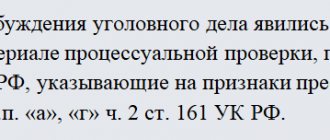An application to initiate a private prosecution case can be submitted by the victim to the court in a limited range of cases in which the applicant himself has the right to assume the role of prosecutor. Files in .DOC: Application form to initiate a private prosecution caseSample application to initiate a private prosecution case
Private prosecution cases
In general, conducting investigations in criminal cases is the prerogative of investigative authorities. However, there are a number of articles of the Criminal Code under which the alleged victim has the right to initiate the procedure for initiating a criminal case, bypassing the investigation stage.
We have already noted above that criminal cases by way of private prosecution can be initiated under a very small number of articles of the Criminal Code of the Russian Federation, namely:
- according to Art. 130 parts 1, 2 of the Criminal Code of the Russian Federation (insulting);
- according to Art. 115 part 1 of the Criminal Code of the Russian Federation (intentional infliction of minor bodily harm);
- according to Art. 116 part 1 of the Criminal Code of the Russian Federation (beatings);
- according to Art. 129 Part 1 of the Criminal Code of the Russian Federation (libel in the absence of aggravating circumstances).
The essence of a private prosecution is that a person who believes that the above-mentioned criminal acts have been committed against him bypasses the stage of investigation and the investigative authorities in general, and directly appeals to the magistrate with a statement to initiate a criminal case.
The court, in this case, becomes the body that determines the possibility of initiating a case. If the judge agrees with the applicant's arguments, he will initiate a criminal case and accept it for his proceedings.
The consideration of a criminal case of private prosecution from the moment the case is initiated becomes usual for the consideration of criminal cases and ends either with a verdict (indictment or acquittal) or a ruling on termination for reconciliation of the parties.
What crimes are private prosecution carried out for?
Every person can go to court to punish the offender
The Criminal Procedure Code stipulates that there are two types of procedural charges - private and public. The latter is carried out by investigative authorities or investigators on cases received by them.
Private prosecution has different specifics. Here the citizen himself becomes the initiator of the accusation and can appeal to the magistrate’s court in order to punish the culprit. Not every case can be brought privately. This includes only the following crimes:
- Causing mild harm to health when it was done intentionally.
- Repeated beating, if the person was previously punished administratively.
- Slander, that is, the dissemination of information discrediting the honor and dignity of another citizen.
In that situation, if the victim himself, for one reason or another, cannot go to court, then his relatives have the right to do so.
Victim as prosecutor
The status of a victim is a status within a criminal case. Accordingly, in order to become a victim, an applicant in a private prosecution case must wait for a court order.
The magistrate, to whose consideration the application is submitted as a private prosecution, will check the applicant's arguments. If he sees elements of a criminal offense in the circumstances of the case, a decision will be made to initiate a criminal case.
In this case, the applicant will be recognized as a victim, and the person against whom a private prosecution complaint is filed will be brought in as a defendant.
From this moment on, the judicial investigation of the criminal case will begin, during which the victim will also take on the procedural role of the prosecutor. As part of this role, the victim will have to provide the court with evidence of the defendant's guilt.
The very fact of initiating a criminal case will not mean that the outcome of the case is predetermined. If the defendant's guilt is not proven at the trial, he will be acquitted.
If during the consideration of the case it is determined that the actions of the defendant should in fact be qualified under another article, the investigation of which is within the competence of the investigative authorities, then the judge, on his own initiative or at the request of the victim, will send the case to the prosecutor's office for further transfer according to jurisdiction.
Procedure for initiating criminal proceedings on private charges
As noted earlier, a feature of initiating a case of this kind is the application of the victim or his relative to the magistrate’s court. The latter cannot refuse to accept the application if it meets all the requirements enshrined in the Criminal Procedure Code of the Russian Federation.
The above rule applies in cases where the offender is known to the victim. However, situations often arise when it is not possible to determine the guilty party. In this case, you must contact the internal affairs authorities. A citizen is not deprived of the right to go to court. The law obliges the court, if it is impossible to determine the culprit, to transfer the case to the police department.
Cases of this kind can be initiated by police officers on their own initiative. This happens in cases where a citizen, for one reason or another, is unable to take the necessary actions aimed at protecting his rights.
The law includes serious illness, mental illness, old age and other types of helpless conditions as such circumstances. The latter refers to the state of dependence of the victim on the criminal, which impedes the realization of his rights to protection (for example, work dependence).
Drawing up an application to initiate a private prosecution case
As part of this article, our users can download a standard template for an application to initiate a private prosecution case and familiarize themselves with a sample of how to fill it out. During the filling process, you will need to enter the following information into the template:
- number of the world site to which the application is sent;
- Full name, address, passport details of the applicant;
- Full name and address of the accused;
- a detailed description of the event in connection with which the applicant requests to initiate a criminal case;
- evidence confirming, from the applicant’s point of view, the guilt of the accused. Documents, certificates, audio and video recordings, newspaper publications, screenshots of messages on the Internet, a list of witnesses who can confirm the guilt of the accused, etc. can be used as evidence;
- the operative part, containing a request to the court to initiate a criminal case under a specific article of the Criminal Code of the Russian Federation in relation to the accused and to accept him for consideration by the court;
- the signature of the applicant stating that he is aware of the consequences that occur in the event of a false denunciation;
- list of attachments to the application;
- date of application and signature of the applicant.
The application and the documents attached to it are submitted to the court in two copies.
Sample application to initiate a criminal case as a private prosecution under Part 1 of Art. 115 of the Criminal Code of the Russian Federation
To the magistrate of judicial district No. 1 of the city of N-sk, N-skaya region, full name (full name) (address of the court district in full) Applicant: full name (full name), month, year of birth, place of birth, passport details, indicating the place of registration and actual place of residence (mobile and landline telephone numbers) Persons held criminally liable: - Full name of the person held criminally liable (*) place of residence and telephone number.
STATEMENT (**) to initiate a criminal case and bring the guilty person to criminal liability as a private prosecution under Part 1 of Art. 115 of the Criminal Code of the Russian Federation (***) .
On 00.00.0000, a conflict arose between me, full name of the applicant (who is also the victim) and the full name of the person involved, due to the personal hostility of the person involved towards me. (Briefly describe the essence of the conflict, the motive, the initiator of the conflict, etc.). During the conflict, the person involved struck me several blows (it is necessary to indicate the location of the crime, i.e. the most accurate location of the event, indicate the most accurate time, at what time of day of the month and year the blows were struck, the most accurate number of blows than blows were applied and in what parts of the body).
As a result of hitting me (full name of the person causing the physical harm), I lost consciousness for some time. I had the following marks on my body from blows (list), and I also felt pain (list in which parts of the body there were painful sensations). An ambulance was called for me (you can indicate who exactly called), and they took me to the emergency room (indicate the emergency room of which clinic or hospital). While I was in the emergency room, police officers from the duty station came to see me and took written explanations from me. The initial entry in the patient's chart indicated the following injuries. After a full inspection and examination, the following damage was discovered (list). I was hospitalized and was treated as an inpatient (specify how many days) and was treated as an outpatient for several days (specify how many). The certificate of incapacity for work was opened on 00.00.0000 and was finally closed on 00.00.0000. In addition to physical harm, I was inflicted moral harm, since I felt severe pain and suffering for a long time. In addition, it is unusual for me to resolve conflicts through physical violence, and since the violence was committed against me without any reason on my part, it made me feel humiliated. I believe that the full name of the person involved committed a crime under Part 1 of Art. 115 of the Criminal Code of the Russian Federation. To confirm the fact and circumstances of the crime committed, I ask the court to call the following witnesses: 1. Full name and home address; 2. Full name and home address; 3. Full name and home address; Reconciliation between me, i.e. the applicant and the person involved, i.e. Full name, did not take place, since the latter does not make contact. In accordance with Part 2 of Art. 20, 44, part 3 art. 42, art. 318 of the Code of Criminal Procedure of the Russian Federation and Part 1 of Art. 115 of the Criminal Code of the Russian Federation, I ASK: 1. Accept a criminal case accusing the full name of the person involved of committing a crime under Part 1 of Art. 115 of the Criminal Code of the Russian Federation, for production. 2. Bring the full name of the person involved, DOB 00.00.0000, native (specify) to criminal liability under Part 1 of Art. 115 of the Criminal Code of the Russian Federation. 3. Appoint a forensic medical examination in this case. 4. To recover in my favor from the full name of the person involved for the moral and physical harm caused to me a sum of money in the amount of 000,000 (in words thousands) rubles. 5. To collect from the full name of the person involved 00,000 (in words thousands) rubles as expenses associated with payment for the services of a representative. Attachments: 1. Copies of the application for the person against whom a criminal case of private prosecution is being initiated; 2. A copy of the discharge summary from the medical record No. of the inpatient in the trauma department of the State Budgetary Institution of Healthcare of the Republican Central Regional Hospital. 3. Copies of an extract from the trauma department of the Central District Hospital; 4. A copy of the power of attorney for the representative; 5. A copy of the contract for the provision of representative services; 6. Original receipt for payment for the representative’s services; 7. Lawyer's order; Applicant: _______________ (full name.) Representative of the applicant, lawyer _______________ (full name.) “____” __________ 2000. I, the full name of the applicant, have been warned of criminal liability for knowingly false denunciation in accordance with Article 306 of the Criminal Code of the Russian Federation. __________________ (signature of the applicant) _______________________________________________________________________________ (*) Either one person or several persons may be brought to criminal liability as a private prosecution. (**) Certain provisions of Art. 318 Code of Criminal Procedure of the Russian Federation. Initiation of a criminal case of private prosecution. 1. Criminal cases for crimes specified in part two of Article 20 of this Code are initiated against a specific person by filing an application to the court by the victim or his legal representative... 5. The application must contain: 1) the name of the court to which it is being filed; 2) a description of the crime event, place, time, as well as the circumstances of its commission; 3) a request addressed to the court to accept the criminal case for proceedings; 3.1) information about the victim, as well as documents proving his identity; 4) information about the person brought to criminal liability; 5) a list of witnesses who must be summoned to court; 6) signature of the person who submitted it. 6. The application is submitted to the court with copies according to the number of persons against whom a criminal case of private prosecution is being initiated. The applicant is warned of criminal liability for knowingly false denunciation in accordance with Article 306 of the Criminal Code of the Russian Federation, about which a note is made in the application, which is certified by the signature of the applicant. At the same time, the magistrate explains to the applicant his right to reconciliation with the person against whom the application was filed. 7. From the moment the court accepts the application for its proceedings, on which a decision is made, the person who filed it is a private prosecutor. The rights provided for in Articles 42 and 43 of this Code must be explained to him, about which a protocol is drawn up, signed by the judge and the person who filed the application. 8. If, after accepting the application for proceedings, it is established that the victim, due to a dependent or helpless state or for other reasons, cannot defend his rights and legitimate interests, then the magistrate has the right to recognize the participation in the case of the legal representative of the victim and the prosecutor as mandatory. Despite the apparent simplicity of private prosecution cases, they are much more complex in terms of their procedural justification, therefore it is advisable to seek the help of a lawyer to draw up a statement. Very often, magistrates, if the listed requirements are not met, refuse to accept the application. (***) The severity of harm to health is determined on the basis of the “Rules for determining the severity of harm caused to human health”, approved by Decree of the Government of the Russian Federation dated August 17, 2007 No. 522, in accordance with which the Order of the Ministry of Health and Social Development of the Russian Federation dated April 24, 2008 No. 194n “On approval of medical criteria for determining the severity of harm caused to human health.” Art. 4 from the Decree of the Government of the Russian Federation for 522 4. Qualifying signs of the severity of harm caused to human health are: c) in relation to minor harm: short-term health disorder; minor persistent loss of general ability to work. Art. 8.9 of the second section of the Order of the Ministry of Health No. 194n. II. Medical criteria for qualifying signs of serious harm to health 8. Medical criteria for qualifying signs in relation to minor harm to health are: 8.1. Temporary impairment of the functions of organs and (or) systems (temporary disability) lasting up to three weeks from the moment of injury (up to 21 days inclusive) (hereinafter referred to as short-term health disorder). 8.2. Minor permanent loss of general ability to work - permanent loss of general ability to work less than 10 percent. 9. Superficial injuries, including: abrasion, bruise, soft tissue contusion, including bruising and hematoma, superficial wound and other injuries that do not entail short-term health problems or minor permanent loss of general ability to work, are regarded as injuries that do not cause harm to health person.
Action plan
Before filing an application in court, it is necessary to prepare the basis so that with a high percentage of probability the judge will side with the victim.
As in a criminal case of public prosecution, here it is necessary to have a full body of evidence. Based on the specifics of the crimes for which the accusation occurs, each of them causes physical or moral harm.
Therefore, recording such damage is a prerequisite for proof. Below we will look in more detail at each element of the action plan.
Collection of evidence
The presence of evidence will ensure success for the victim
Evidence is the circumstances that need to be established in order to make a decision about a person’s guilt or the absence of criminal intent in his actions.
In criminal proceedings, the following must be proven:
- The presence of the crime itself.
- The degree of harmful consequences encountered.
- Guilt of the person.
The Criminal Procedure Code of the Russian Federation also contains other circumstances that are subject to proof, but in private prosecution the victim does not have the opportunity to collect and prepare them, therefore, to submit an application to the court, it is enough to establish at least the above facts.
The collection of evidence must take place within the framework of the law, without violating the rights and legitimate interests of other persons.
Record injuries
If, as a result of illegal actions, a citizen has suffered physical injuries, injuries and other harm must be recorded. To do this, you can call an ambulance, which will provide first aid and perform fixation.
If the citizen’s condition allows him to do this, then he can go to the emergency room, where they will issue a certificate of injury. This document will be considered one of the main pieces of evidence, for example, when considering a case of beatings.
Watch a video on how to properly remove a beating:
Call the police
It is not necessary to call the police in private prosecution cases. For example, in case of slander, there is no need to call police officers.
The meaning of a private charge is based on the fact that a citizen exercises self-defense of his rights, while turning to the court for help. The police are involved to a greater extent in cases of public prosecution.
Interview your neighbors
Interviewing neighbors can help in situations where they have witnessed a crime being committed. In this case, their testimony can help when considering the case in court.
As a rule, the application indicates the full names of witnesses and their addresses so that the court has the opportunity to attract these persons to testify at the hearing.
Search for other evidence
Other evidence in this case may include correspondence on the Internet, recordings from surveillance cameras, video recordings, etc. As a rule, the court does not resort to other evidence if there are medical reports or testimony of witnesses. In other situations, such evidence can play a decisive role.
Preparing charges
Only an inquiry or investigation officer has the right to prepare charges. The citizen himself, when filing a statement in court, is not involved in preparing charges.
He has the right only to collect and provide evidence indicating the guilt of the criminal. The court, based on the documents received, will make a conclusion about the guilt or innocence of the person.
Filing an application to the magistrate's court. Sample
An application to the court can be submitted in writing or in the form of an electronic document. A sample is available on the website of any judicial district. The application has a preamble, a description of the circumstances of the case and the request itself.
At the end, appendices must be indicated, that is, those acts that were referenced in the letter to the court itself are listed. Let's take a closer look at the content of the statement.
What should it contain?
The application must include:
- An indication of the applicant and his contact information.
- Information about the cause of harm.
- Description of the circumstances of the case.
- Pointing to witnesses.
The application is signed by the person submitting it and the date of preparation is indicated. The act is accompanied by evidence and copies in the amount of how many parties are expected to be involved in the case.
What documents must be attached
First of all, copies of such an act, a certificate of harm to health or the presence of other types of damage are used as an appendix. Any other evidence may be used, provided that it is relevant to the case.
Examples of legal documents:
The following acts can be cited as examples:
- Certificate from the emergency room confirming the presence of bruises, cuts, and bruises.
- A screenshot of a page on the Internet certified by a notary that contains information containing slander.
- Copy of evidence for the defendant.
- Receipts from the hospital confirming expenses for treatment as a result of injuries, etc.
There can be a great variety of documents in this situation. It all depends on the circumstances of the act committed, the severity, the identity of the victim and the accused.







